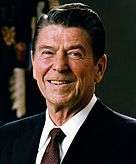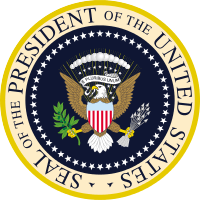Electoral history of Ronald Reagan
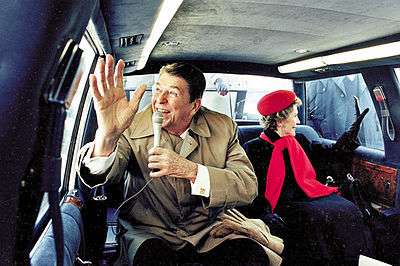
| ||
|---|---|---|
President of the United States First term Second term Post-Presidency
|
||
This is the electoral history of Ronald Reagan. Reagan, a Republican, served as the 40th President of the United States (1981–89) and earlier as the 33rd Governor of California (1967–75).
Having been elected twice to the presidency,[1] Reagan reshaped the Republican party, led the modern conservative movement, and altered the political dynamic of the United States.[2] His 1980 presidential campaign stressed some of his fundamental principles: lower taxes to stimulate the economy,[3] less government interference in people's lives,[4] states' rights,[5] and a strong national defense.[6]
During his presidency, Reagan pursued policies that reflected his personal belief in individual freedom, brought changes domestically, both to the U.S. economy and expanded military, and contributed to the end of the Cold War.[7] Termed the Reagan Revolution, his presidency would reinvigorate American morale,[8][9] reinvigorate the American economy and reduce American reliance upon government.[7]
In addition to this, Reagan was the oldest person ever elected to the presidency, at the age of 69 on the date of his first presidential election victory in 1980.[10] He was surpassed in 2016 by Donald Trump as the oldest person first elected to the presidency, but Reagan still remains the oldest person ever elected president, in 1984 at 73.
California gubernatorial election, 1966
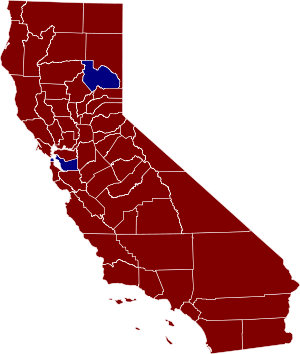
California Republicans were impressed with Reagan's political views and charisma after his "Time for choosing" speech,[11] he announced in late 1965, his campaign for Governor of California in 1966.[12][13] He defeated former San Francisco mayor George Christopher in the GOP primary. In Reagan's campaign, he emphasized two main themes: "to send the welfare bums back to work", and, in reference to burgeoning anti-war and anti-establishment student protests at the University of California at Berkeley, "to clean up the mess at Berkeley".[14] Ronald Reagan accomplished in 1966 what US Senator William F. Knowland in 1958 and former Vice-President Richard M. Nixon in 1962 had tried: he was elected, defeating two-term governor Edmund G. "Pat" Brown,[15] and was sworn in as the 33rd governor of California on January 2, 1967.[11][16]
Republican primary
| Party | Candidate | Votes | % | |
|---|---|---|---|---|
| Republican | Ronald Reagan | 1,417,623 | 64.62 | |
| Republican | George Christopher | 675,683 | 30.80 | |
| Republican | Warren N. Dorn | 44,812 | 2.04 | |
| Republican | William Penn Patrick | 40,887 | 1.86 | |
| Republican | Joseph R. Maxwell | 7,052 | 0.32 | |
| Republican | Sam Yorty (write-in) | 5,993 | 0.27 | |
| Republican | Pat Brown (inc.) (write-in) | 1,700 | 0.08 | |
| Total votes | 2,193,750 | 100 | ||
Democratic primary
| Party | Candidate | Votes | % | |
|---|---|---|---|---|
| Democratic | Pat Brown (inc.) | 1,355,262 | 51.91 | |
| Democratic | Sam Yorty | 981,088 | 37.58 | |
| Democratic | Carlton Benjamin Goodlett | 95,476 | 3.66 | |
| Democratic | Wallace J. Duffy | 77,029 | 2.95 | |
| Democratic | Dale Alexander | 43,453 | 1.66 | |
| Democratic | Ronald Reagan (write-in) | 27,422 | 1.05 | |
| Democratic | Ingram W. Goad | 18,088 | 0.69 | |
| Total votes | 2,597,818 | 100 | ||
General election
| Party | Candidate | Votes | % | |||
|---|---|---|---|---|---|---|
| Republican | Ronald Reagan | 3,742,913 | 57.55 | |||
| Democratic | Pat Brown (incumbent) | 2,749,174 | 42.27 | |||
| Other | Various candidates | 11,358 | 0.18 | |||
| Total votes | 6,503,445 | 100.00 | ||||
| Voter turnout | 57.70% | |||||
| Republican gain from Democratic | ||||||
1968 presidential election
Shortly after the beginning of his term as California governor, Reagan tested the presidential waters in 1968 as part of a "Stop Nixon" movement, hoping to cut into Nixon's Southern support[20] and be a compromise candidate[21] if neither Nixon nor second-place Nelson Rockefeller received enough delegates to win on the first ballot at the Republican convention. However, by the time of the convention Nixon had 692 delegate votes, 25 more than he needed to secure the nomination, followed by Rockefeller with Reagan in third place.[20]
1968 Republican presidential primaries
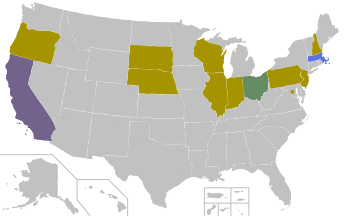
| Candidate | Number of votes[22] | Percentage[22] | States carried[23] |
|---|---|---|---|
| Ronald Reagan | 1,696,632 | 37.93% | 1 |
| Richard Nixon | 1,679,443 | 37.54% | 9 |
| James A. Rhodes | 614,492 | 13.74% | 1 |
| Nelson A. Rockefeller | 164,340 | 3.67% | 1 |
| Unpledged | 140,639 | 3.14% | 0 |
| Eugene McCarthy (write-in) | 44,520 | 1.00% | 0 |
| Harold Stassen | 31,655 | 0.71% | 0 |
| John Volpe | 31,465 | 0.70% | 0 |
| Others | 21,456 | 0.51% | 0 |
| George Wallace (write-in) | 15,291 | 0.34% | 0 |
| Robert Kennedy (write-in) | 14,524 | 0.33% | 0 |
| Hubert Humphrey (write-in) | 5,698 | 0.13% | 0 |
| Lyndon B. Johnson (write-in) | 4,824 | 0.11% | 0 |
| George Romney | 4,447 | 0.10% | 0 |
| Raymond P. Shafer | 1,223 | 0.03% | 0 |
| William W. Scranton | 724 | 0.02% | 0 |
| Charles H. Percy | 689 | 0.02% | 0 |
| Barry M. Goldwater | 598 | 0.01% | 0 |
| John V. Lindsay | 591 | 0.01% | 0 |
1968 Republican National Convention
| President | (before switches) | (after switches) | Vice President | Vice-Presidential votes |
|---|---|---|---|---|
| Richard M. Nixon | 692 | 1238 | Spiro T. Agnew | 1119 |
| Nelson Rockefeller | 277 | 93 | George Romney | 186 |
| Ronald Reagan | 182 | 2 | John V. Lindsay | 10 |
| Ohio Governor James A. Rhodes | 55 | — | Massachusetts Senator Edward Brooke | 1 |
| Michigan Governor George Romney | 50 | — | James A. Rhodes | 1 |
| New Jersey Senator Clifford Case | 22 | — | Not Voting | 16 |
| Kansas Senator Frank Carlson | 20 | — | — | |
| Arkansas Governor Winthrop Rockefeller | 18 | — | — | |
| Hawaii Senator Hiram Fong | 14 | — | — | |
| Harold Stassen | 2 | — | — | |
| New York City Mayor John V. Lindsay | 1 | — | — |
California gubernatorial election, 1970
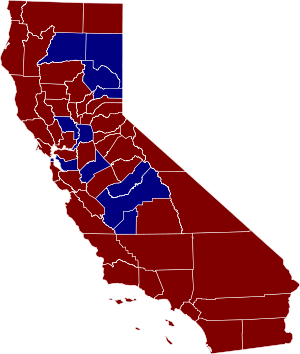
Despite an unsuccessful attempt to recall him in 1968,[25] Reagan was re-elected in 1970, defeating "Big Daddy" Jesse Unruh.[16] He did not seek a third term in the following election cycle.
| Party | Candidate | Votes | % | |
|---|---|---|---|---|
| Republican | Ronald Reagan (incumbent) | 3,439,174 | 52.83 | |
| Democratic | Jesse M. Unruh | 2,938,607 | 45.14 | |
| Peace and Freedom | Ricardo Romo | 65,954 | 1.01 | |
| American Independent | William K. Shearer | 65,847 | 1.01 | |
| Invalid or blank votes | 123,851 | 1.87 | ||
| Total votes | 6,633,433 | 100.00 | ||
| Voter turnout | 54.50% | |||
| Republican hold | ||||
1976 presidential election
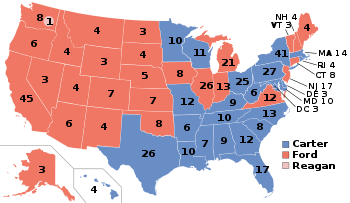
In 1976, Reagan challenged incumbent President Gerald Ford in a bid to become the Republican Party's candidate for president. Reagan soon established himself as the conservative candidate with the support of like-minded organizations such as the American Conservative Union which became key components of his political base, while President Ford was considered a more moderate Republican.[28] Though Reagan lost the Republican nomination, he received 307 write-in votes in New Hampshire, 388 votes as an Independent on Wyoming's ballot, and a single electoral vote from a faithless elector in the November election from the state of Washington,[29] which Ford had won over Democratic challenger Jimmy Carter. Ford ultimately lost the general election to Carter.
1976 Republican presidential primaries
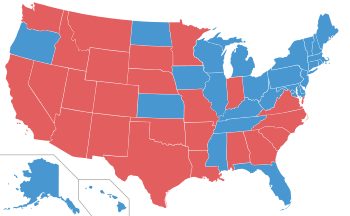
| Candidate | Number of votes[30] | Percentage[30] | States carried[31] |
|---|---|---|---|
| Gerald Ford (inc.) | 5,529,899 | 53.29% | 27 |
| Ronald Reagan | 4,760,222 | 45.88% | 23 |
| Unpledged | 34,717 | 0.34% | 0 |
1976 Republican National Convention (Presidential tally)
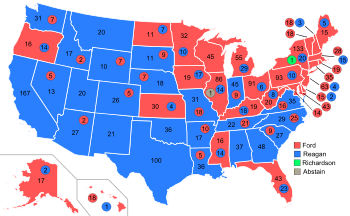
| Republican National Convention Presidential nominee vote, 1976[32] | ||
|---|---|---|
| Candidate | Votes | Percentage |
| Gerald Ford (inc.) | 1,187 | 52.57% |
| Ronald Reagan | 1,070 | 47.39% |
| Elliot Richardson | 1 | 0.04% |
| Totals | 2,258 | 100.00% |
1976 Republican National Convention (Vice Presidential tally)
| Candidate[33] | Votes received[33] | Percentage[33] |
|---|---|---|
| Bob Dole | 1,921 | 85.04% |
| Abstaining | 103 | 4.56% |
| Jesse Helms | 103 | 4.56% |
| Ronald Reagan | 27 | 1.20% |
| Phil Crane | 23 | 1.02% |
| John Grady | 19 | 0.84% |
| Louis Frey | 9 | 0.40% |
| Anne Armstrong | 6 | 0.27% |
| Howard Baker | 6 | 0.27% |
| William F. Buckley | 4 | 0.18% |
| John B. Connally | 4 | 0.18% |
| David C. Treen | 4 | 0.18% |
| Alan Steelman | 3 | 0.13% |
| Edmund Bauman | 2 | 0.09% |
| Bill Brock | 2 | 0.09% |
| Paul Laxalt | 2 | 0.09% |
| Elliot Richardson | 2 | 0.09% |
| Richard Schweiker | 2 | 0.09% |
| William E. Simon | 2 | 0.09% |
| Jack Wellborn | 2 | 0.09% |
| James Allen | 1 | 0.04% |
| Ray Barnhardt | 1 | 0.04% |
| George H. W. Bush | 1 | 0.04% |
| Pete Domenici | 1 | 0.04% |
| James B. Edwards | 1 | 0.04% |
| Frank S. Glenn | 1 | 0.04% |
| David Keene | 1 | 0.04% |
| James McClure | 1 | 0.04% |
| Nancy Palm | 1 | 0.04% |
| Donald Rumsfeld | 1 | 0.04% |
| John W. Sears | 1 | 0.04% |
| Roger Staubach | 1 | 0.04% |
| Steve Symms | 1 | 0.04% |
Election results
| Presidential candidate | Party | Home state | Popular vote[34] | Electoral vote[35] |
Running mate | |||
|---|---|---|---|---|---|---|---|---|
| Count | Pct | Vice-presidential candidate | Home state | Elect. vote[36] | ||||
| James Earl Carter Jr. | Democratic | Georgia | 40,831,881 | 50.08% | 297 | Walter Frederick Mondale | Minnesota | 297 |
| Gerald Rudolph Ford Jr. (Incumbent) | Republican | Michigan | 39,148,634 | 48.02% | 240 | Bob Dole | Kansas | 241 |
| Ronald Wilson Reagan | Republican | California | —(a) | —(a) | 1 | |||
| Eugene McCarthy | (none) | Minnesota | 740,460 | 0.91% | 0 | (b) | (b) | 0 |
| Roger MacBride | Libertarian | Vermont | 172,553 | 0.21% | 0 | David Bergland | California | 0 |
| Lester Maddox | American Independent | Georgia | 170,274 | 0.21% | 0 | William Dyke | Wisconsin | 0 |
| Thomas J. Anderson | American | (c) | 158,271 | 0.19% | 0 | Rufus Shackelford | 0 | |
| Peter Camejo | Socialist Workers | California | 90,986 | 0.11% | 0 | Willie Mae Reid | 0 | |
| Gus Hall | Communist | New York | 58,709 | 0.07% | 0 | Jarvis Tyner | 0 | |
| Margaret Wright | People's | 49,013 | 0.06% | 0 | Benjamin Spock | 0 | ||
| Lyndon LaRouche | U.S. Labor | New York | 40,043 | 0.05% | 0 | R. Wayne Evans | 0 | |
| Other | 70,785 | 0.08% | — | Other | — | |||
| Total | 81,531,584 | 100% | 538 | 538 | ||||
| Needed to win | 270 | 270 | ||||||
1980 presidential election
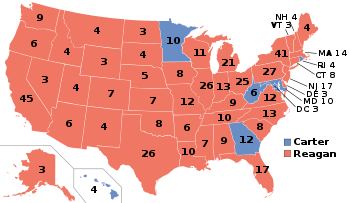
Reagan ran against Democratic incumbent Jimmy Carter and independent candidate John B. Anderson.[1][37] He was praised by supporters for running a campaign of upbeat optimism.[38] Aided by the Iran hostage crisis and a worsening economy at home marked by high unemployment and inflation, Reagan won the election in a massive landslide.[10][39] The 1980 presidential election marked the beginning of the Reagan Era, and signified a conservative realignment in national politics.[40][41] At 69 years old, Reagan became the oldest person ever elected U.S. president.[10]
1980 Republican presidential primaries
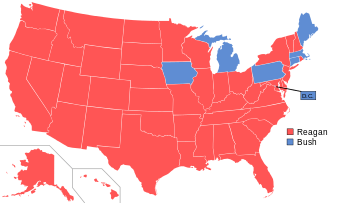
| Candidate | Number of votes[42] | Percentage[42] | States carried[43] |
|---|---|---|---|
| Ronald Reagan | 7,709,793 | 59.79% | 44 |
| George H. W. Bush | 3,070,033 | 23.81% | 6 |
| John B. Anderson | 1,572,174 | 12.19% | 0 |
| Howard Baker | 181,153 | 1.41% | 0 |
| Phil Crane | 97,793 | 0.76% | 0 |
| John B. Connally | 82,625 | 0.64% | 0 |
| Unpledged | 68,155 | 0.53% | 0 |
| Ben Fernandez | 68,155 | 0.53% | 0 |
| Harold Stassen | 25,425 | 0.20% | 0 |
| Gerald Ford | 10,557 | 0.08% | 0 |
| Bob Dole | 7,204 | 0.06% | 0 |
1980 Republican National Convention (Presidential tally)
| Republican National Convention Presidential nominee vote, 1980[44] | ||
|---|---|---|
| Candidate | Votes | Percentage |
| Ronald Reagan | 1,939 | 97.44% |
| John B. Anderson | 37 | 1.86% |
| George H. W. Bush | 13 | 0.65% |
| John B. Connally and Anne Armstrong | 1 each | 0.05% |
| Totals | 2,258 | 100.00% |
Election results
1984 presidential election
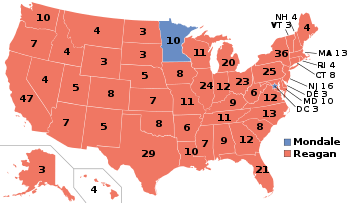
Reagan ran for reelection as President in 1984, running against Democrat Walter Mondale. Reagan was re-elected, winning 49 of 50 states.[47] Reagan won a record 525 electoral votes, the most of any candidate in United States history,[48] and received 58.8% of the popular vote to Mondale's 40.6%.[47] Only Franklin D. Roosevelt, in 1936, had a higher electoral landslide.[49] At 73 years old, Reagan again became the oldest person elected to the presidency, breaking his own record in 1980.[50]
1984 Republican presidential primaries
.svg.png)
| Candidate | Number of votes[51] | Percentage[51] | States carried[51] |
|---|---|---|---|
| Ronald Reagan (inc.) | 6,484,987 | 98.78% | 50 |
| Unpledged | 55,458 | 0.85% | 0 |
| Harold Stassen | 12,749 | 0.19% | 0 |
1984 Republican National Convention (Presidential tally)
| Candidate | Number of votes[52] | Percentage[52] |
|---|---|---|
| Ronald Reagan (inc.) | 2,233 | 99.91% |
| Abstaining | 2 | 0.09% |
Election results
See also
- Democratic Party, Reagan was a member of this party early in his life, but was mainly opposed by this party during his political career.
- Reagan coalition, a term for the combination of voters who supported Reagan and his election campaigns.
- Reagan Democrat, a term used for a traditional Democratic voter who defected from their party to support Reagan in 1980 and 1984.
- Reagan's coattails, a term used to describe the influence of Reagan's popularity on elections other than his own, after the American political expression to “ride in on another’s coattails.”
References
- 1 2 "Ronald Reagan: Campaigns and Elections". Miller Center of Public Affairs. Retrieved June 27, 2016.
- ↑ Loughlin, Sean (July 6, 2004). "Reagan cast a wide shadow in politics". CNN. Retrieved June 19, 2008.
- ↑ Uchitelle, Louis (September 22, 1988). "Bush, Like Reagan in 1980, Seeks Tax Cuts to Stimulate the Economy". The New York Times. Retrieved February 6, 2008.
- ↑ Hakim, Danny (March 14, 2006). "Challengers to Clinton Discuss Plans and Answer Questions". The New York Times. Retrieved February 6, 2008.
- ↑ Kneeland, Douglas E. (August 4, 1980) "Reagan Campaigns at Mississippi Fair; Nominee Tells Crowd of 10,000 He Is Backing States' Rights." The New York Times. p. A11. Retrieved January 1, 2008.
- ↑ John David Lees, Michael Turner. Reagan's first four years: a new beginning? Manchester University Press ND, 1988. p. 11
- 1 2 Freidel, Frank; Sidey, Hugh (1995). The Presidents of the United States of America. Washington, D.C.: White House Historical Association. p. 84. ISBN 0-912308-57-5.
- ↑ Hayward, Steven F (May 16, 2005). "Reagan in Retrospect". American Enterprise Institute for Public Policy Research. Archived from the original on March 13, 2009. Retrieved April 7, 2009.
- ↑ Cannon (1991, 2000), p. 746
- 1 2 3 Hedrick Smith (November 5, 1980). "Reagan Easily Beats Carter; Republicans Gain in Congress". The New York Times. Retrieved June 29, 2016.
- 1 2 "The Governors' Gallery – Ronald Reagan". California State Library. Retrieved March 21, 2007.
- ↑ Gerard J. De Groot, "'A Goddamned Electable Person': The 1966 California Gubernatorial Campaign of Ronald Reagan." History 82#267 (1997) pp: 429–448.
- ↑ Totton J. Anderson and Eugene C. Lee, "The 1966 Election in California," Western Political Quarterly (1967) 20#2 pp. 535–554 in JSTOR
- ↑ Kahn, Jeffery (June 8, 2004). "Ronald Reagan launched political career using the Berkeley campus as a target". UC Berkeley News. Retrieved March 30, 2007.
- 1 2 "Our Campaigns – CA Governor – R Primary Race – Jun 07, 1966". Ourcampaigns.com. Retrieved August 4, 2015.
- 1 2 "Timeline . Reagan . American Experience . WGBH". Pbs.org. Retrieved June 29, 2016.
- ↑ "Our Campaigns – CA Governor – D Primary Race – Jun 07, 1966". Ourcampaigns.com. Retrieved August 4, 2015.
- ↑ "CA Governor Race – Nov 08, 1966". Our Campaigns. Retrieved August 19, 2015.
- ↑ "1966 Gubernatorial General Election Results – California". uselectionatlas.org. Retrieved December 5, 2015.
- 1 2 Fischer, Klaus (2006). America in White, Black, and Gray: The Stormy 1960s. Continuum. pp. 241–243. ISBN 0-8264-1816-3.
- ↑ "The New Rules of Play". Time. March 8, 1968. Retrieved October 16, 2007.
- 1 2 "Our Campaigns – US President – D Primaries Race – Mar 12, 1968". Ourcampaigns.com. Retrieved August 4, 2015.
- ↑ "Primaries, caucuses and conventions: Classic races for the presidential nomination". Geocities.com. Archived from the original on October 27, 2009. Retrieved August 4, 2015.
- ↑ "1968 | Presidential Campaigns & Elections Reference". Presidentialcampaignselectionsreference.wordpress.com. Retrieved November 27, 2015.
- ↑ Recall Idea Got Its Start in L.A. in 1898, Los Angeles Times, July 13, 2003
- ↑ "CA Governor Race – Nov 03, 1970". Our Campaigns. Retrieved August 19, 2015.
- ↑ "1970 Gubernatorial General Election Results – California". uselectionatlas.org. Retrieved December 5, 2015.
- ↑ "Biography of Gerald R. Ford". The White House. Retrieved March 29, 2007. Ford considered himself as "a moderate in domestic affairs, a conservative in fiscal affairs, and a dyed-in-the-wool internationalist in foreign affairs".
- ↑ "Electoral College Box Scores 1789–1996". U.S. National Archives and Records Admin. Retrieved April 30, 2007.
- 1 2 "Our Campaigns – US President – R Primaries Race – Feb 01, 1976". Ourcampaigns.com. Retrieved August 4, 2015.
- ↑ "Elections". Geocities.com. Archived from the original on October 26, 2009. Retrieved August 4, 2015.
- ↑ "Our Campaigns – US President – R Convention Race – Aug 16, 1976". Ourcampaigns.com. Retrieved August 4, 2015.
- 1 2 3 "Our Campaigns – US Vice President – R Convention Race – Aug 16, 1976". Ourcampaigns.com. Retrieved August 4, 2015.
- ↑ Leip, David. "1976 Presidential Election Results". Dave Leip's Atlas of U.S. Presidential Elections. Retrieved August 7, 2005.
- ↑ "Electoral College Box Scores 1789–1996". National Archives and Records Administration. Retrieved August 7, 2005.
- ↑ "Electoral College Box Scores 1789–1996". National Archives and Records Administration. Retrieved August 7, 2005.
- 1 2 Leip, David. "1980 Presidential Election Results". Dave Leip's Atlas of U.S. Presidential Elections. Retrieved August 7, 2005.
- ↑ Skinner, Kudelia; Mesquita, Rice (2007). The Strategy of Campaigning. University of Michigan Press. ISBN 978-0-472-11627-0. Retrieved October 20, 2008.
- ↑ Harold Jackson; Alex Brummer (November 5, 1980). "A landslide makes it President Reagan | US news". The Guardian. Retrieved June 29, 2016.
- ↑ Troy, Gil. "The Age of Reagan | The Gilder Lehrman Institute of American History". Gilderlehrman.org. Retrieved June 29, 2016.
- ↑ Page, Susan (June 6, 2004). "USATODAY.com - Reagan's political force realigned political landscape". Usatoday30.usatoday.com. Retrieved June 29, 2016.
- 1 2 "Our Campaigns – US President – R Primaries Race – Feb 17, 1980". Ourcampaigns.com. Retrieved August 4, 2015.
- ↑ "Elections". Geocities.com. Archived from the original on October 26, 2009. Retrieved August 4, 2015.
- ↑ "Our Campaigns – US President – R Convention Race – Jul 14, 1980". Ourcampaigns.com. Retrieved August 4, 2015.
- ↑ "Electoral College Box Scores 1789–1996". National Archives and Records Administration. Retrieved August 7, 2005.
- ↑ "Electoral College Box Scores 1789–1996". National Archives and Records Administration. Retrieved August 7, 2005.
- 1 2 3 Leip, David. "1984 Presidential Election Results". Dave Leip's Atlas of U.S. Presidential Elections. Retrieved August 19, 2015.
- ↑ "The Reagan Presidency". Ronald Reagan Presidential Foundation. Retrieved April 19, 2008.
- ↑ "United States presidential election of 1984 | United States government". Britannica.com. Retrieved June 29, 2016.
- ↑ Raines, Howell (November 7, 1984). "Reagan Wins By a Landslide, Sweeping at Least 48 States - G.O.P. Gains Strength in House". NYTimes.com. Retrieved June 29, 2016.
- 1 2 3 "Our Campaigns – US President – R Primaries Race – Feb 20, 1984". Ourcampaigns.com. Retrieved August 4, 2015.
- 1 2 "Our Campaigns – US President – R Convention Race – Aug 20, 1984". Ourcampaigns.com. Retrieved August 4, 2015.
- ↑ "Electoral College Box Scores 1789–1996". National Archives and Records Administration. Retrieved August 7, 2005.
- ↑ "Electoral College Box Scores 1789–1996". National Archives and Records Administration. Retrieved August 7, 2005.
.jpg)
